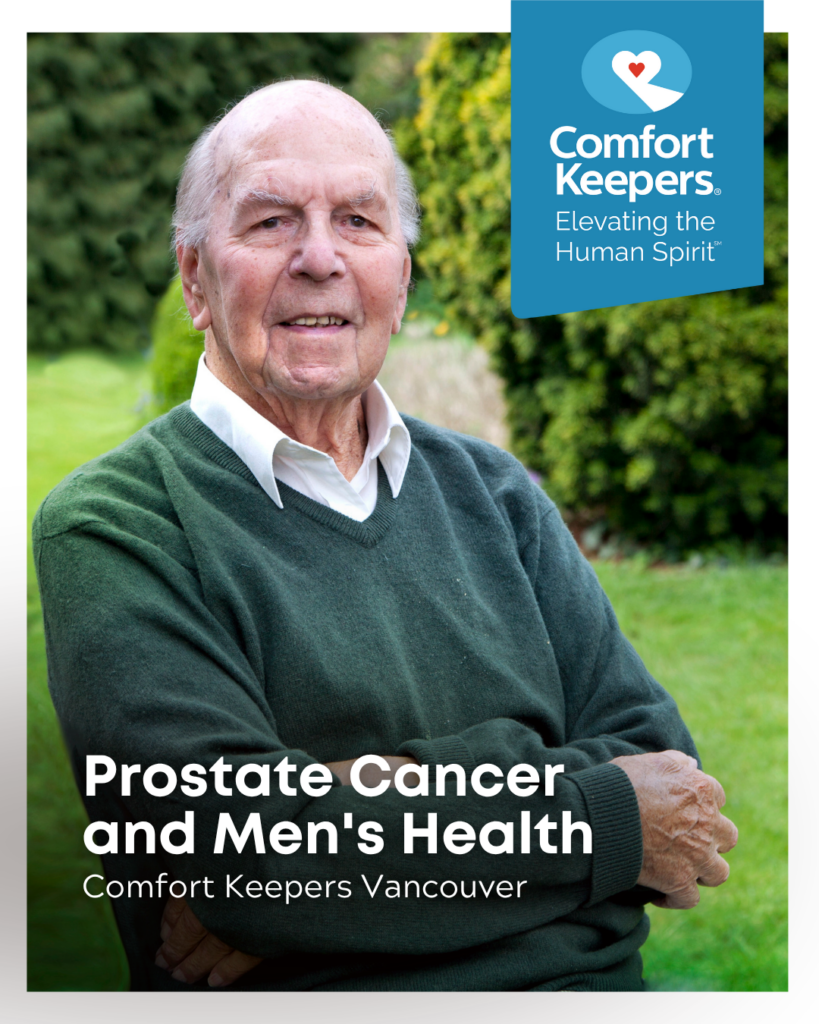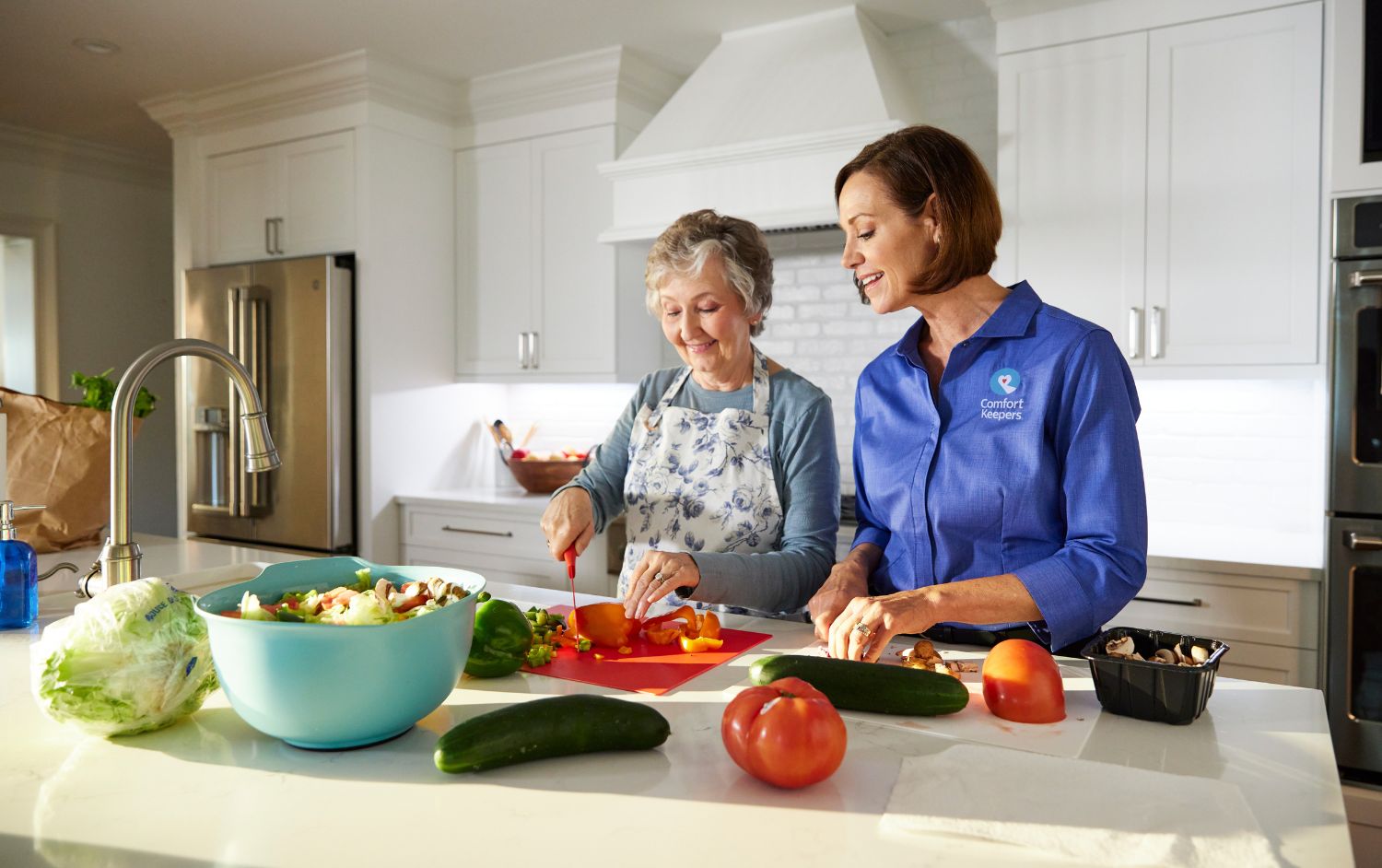Prostate Cancer and Men’s Health
Vancouver Senior Health | June 11, 2025

What Every Family in Vancouver, BC, Needs to Know About The Causes, Symptoms, and Treatment of Prostate Cancer
The month of June is dedicated to Men’s Health, a vital aspect of every man’s well-being and quality of life. Prostate cancer stands as the most prevalent cancer in Canadian men, as reported by the Canadian Cancer Society. Tragically, it also ranks as the third leading cause of cancer-related deaths among men in Canada.
Prostate Health: A Growing Concern for Seniors
In 2017, the Canadian Cancer Society projected 21,600 new prostate cancer diagnoses and 4,000 related deaths. This prevalence is partly due to increased life expectancy, as 80% of cases occur in men 65 and older. Though the exact cause remains elusive, significant scientific strides have been made in understanding the genetic factors at play.
Senior Prostate Cancer: Potential Causes and Risk Factors
Changes in a prostate cell’s DNA can lead to prostate cancer, as researchers have found. Some of these genetic alterations are hereditary, meaning they are passed down from parents to their children.
As with many cancers, the genetic factor is not to be underestimated. In fact, a man is twice as likely to have prostate cancer if his brother has/had it. Those that have Lynch syndrome, a hereditary disorder caused by genetic changes, also are at higher risk.
Some of these changes, known as acquired mutations, may occur during the course of one’s life. One potential source for these acquired mutations is diet, as some studies have suggested that vitamin D deficiency may be a predictor of aggressive prostate cancer.
Exposure to certain chemicals may be another source of acquired mutations. A recent study found that U.S. veterans exposed to Agent Orange, a chemical defoliant used during the Vietnam War, had a significantly increased (48% higher) risk of development versus veterans who had not been exposed.
Symptoms of Prostate Cancer in Seniors
The risk of developing prostate cancer increases once men reach the age of 50. However, one of the more challenging aspects of prostate cancer is that symptoms often do not manifest until later stages of development, since it tends to grow slowly.
Common Symptoms of Prostate Cancer:
- Frequent urination (especially urges at night)
- Difficulty urinating
- Bladder control difficulty
- Blood in the urine and/or semen
- Swelling in the legs or pelvis
- Chronic bone pain
- Erectile dysfunction
As some men may have an “out of sight, out of mind” attitude toward medical issues, it is vital that they discuss testing with a physician as close to the age of 50 as possible – especially if they’ve experienced any of the symptoms listed above.
Screening is often done either by testing for prostate-specific antigen levels (PSA) levels in the blood, or by a digital rectal exam (DRE). If the results come back positive, the doctor may wish to test further.
Although screening can help detect prostate cancer, it does not always help gauge the severity or threat level. Additionally, test results may be false-positive (signifying that a man does have cancer when he does not), or false-negatives (signifying that he does have cancer when he does not).
Senior Cancer Treatment Options
As mentioned, doctors may not have a full understanding of how threatening a man’s prostate cancer may be – which can make it difficult to recommend treatment. Often times, these treatments – done through surgery and/or radiation – can negatively affect various aspects of normal living, especially for older men.
Many health communities tend to agree that screening (and potentially treatment) for older men may not be greatly beneficial since they are more likely to die from other conditions, should they exist.
That is not to say that prostate cancer does not pose a threat. While treatment may potentially be more harmful than the cancer itself, it’s not to be taken lightly. If your aging loved one is concerned about his prostate and unsure about screening, it’s important to begin the discussion with his doctor and to see what the best course of action is, given factors such as age and health. Screening/treatment should always be mutually agreed upon by both your loved one and his doctor.
Comfort Keepers® Vancouver Can Help
At Comfort Keepers® Vancouver, our caregivers can help provide a daily routine for your loved one that promotes good health and independent living. We can also make sure that he or she has transportation to and from any scheduled appointments.
The Best Senior Home Care Provider in Vancouver, BC, is Comfort Keepers®
Many families prefer Comfort Keepers® when arranging senior home care services for a loved one in or around Vancouver, British Columbia.
If you are concerned about the health and well-being of your aging loved ones, we can help with 24-hour care. Comfort Keepers Vancouver also provides home care services like respite care, overnight care, Alzheimer’s disease and dementia care, personal care, and more!
Comfort Keepers® Vancouver Can Help with Companion Care and Interactive Caregiving™
Personal and empathetic care starts in the heart and allows us to meet our clients’ needs. Comfort Keeper’s philosophy is to elevate the human spirit, and our caregivers ensure your loved one experiences a better quality of life.
Trained caregivers help provide our senior clients with personal home care to help maintain the highest possible quality of life, keeping them happy and healthy at home. Our Interactive Caregiving™ delivers a system of care that addresses safety, nutrition, mind, body, and activities of daily living (ADLs).
Bring The Best Home Care Assistance for Seniors Right Where You Live with Comfort Keepers®
Comfort Keepers® Vancouver is proud to provide elder care in homes throughout Vancouver, keeping seniors safe in their homes. We provide home care for the seniors of Vancouver and the surrounding areas of Burnaby, Langley, Richmond, Surrey, White Rock, New Westminster, and Abbotsford. Please call (604) 689-8609.
Personal Care and Senior Homecare in Vancouver, BC
Learn more about our unique service, which offers personal care, companionship care, palliative and end-of-life care. Contact the Comfort Keepers® Vancouver office today.
Accredited and Quality Respite Care Available 24/7 for British Columbia Families
Accreditation Canada has awarded Comfort Keepers® Vancouver with Exemplary Standing. This designation is only achieved after an organization’s policies, procedures, and processes undergo a thorough evaluation by industry experts to ensure they meet or exceed the stringent quality standards set by Accreditation Canada for Home Care companies.
References:
- National Cancer Institute. “Prostate Cancer Overview.” Web. 2017.
- Cancer Treatment Centers of America. “Prostate Cancer Symptoms.” Web. 2017.
- American Cancer Society. “Early Detection.” Web. 2017.
- Medical News Today. “Prostate Cancer: Symptoms and Causes” by Christian Nordqvist. Web. 2017.
Individualized Home Care Options
Long-Term Home Care, 24 Hour Home Care & Short Term Care Options Customized for You







